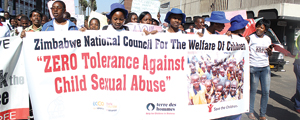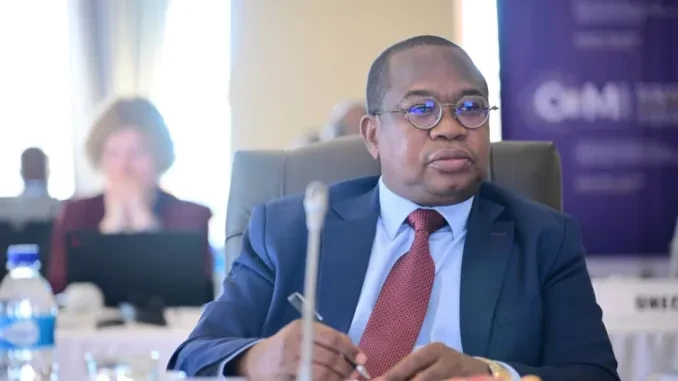
EXPERTS have argued that overlooking traditional leaders in the fight against child sexual abuse is like attempting to drive a car without fuel.
Winston Antonio

The fight against child abuse and violence against women at grassroots level must not be left to law-enforcement agents only.
Communities, led by traditional leaders, must play a leading role in fighting the problem. There have been suggestions that traditional leaders should help form committees in their areas whose sole focus is the fight against child sexual abuse.
Zimbabwe National Council for the Welfare of Children (ZNCWC) national director Reverend Taylor Nyanhete expressed concern over the increase in cases of parents and adults who are sexually abusing their children.
He urged traditional leaders to join hands and fight against child abuse as they hold influence in their communities.
“What is upsetting is that statistics of reported cases of child abuse from the police and Childline show that parents, guardians and teachers, who are supposed to protect the children, have become the perpetrators of abuse,” Nyanhete said.
- Chamisa under fire over US$120K donation
- Mavhunga puts DeMbare into Chibuku quarterfinals
- Pension funds bet on Cabora Bassa oilfields
- Councils defy govt fire tender directive
Keep Reading
“Suggestions show that most of the abuses occur in family set-ups, with male relatives often being the perpetrators. There is need to educate people in rural areas of the importance of upholding the rights of children.”
Nyanhete said there was also a worrisome trend where parents were marrying off under-age children who would have dropped out of school.
 “With such sad issues we need to scale up child protection where there is need for child protection committees to be on the preventative side than being reactive as many cases might go unreported because some families choose to sweep them under the carpet resulting in many offenders going unpunished,” Nyanhete said.
“With such sad issues we need to scale up child protection where there is need for child protection committees to be on the preventative side than being reactive as many cases might go unreported because some families choose to sweep them under the carpet resulting in many offenders going unpunished,” Nyanhete said.
Nyanhete said a lot still needs to be done to protect children, adding that his organisation will soon launch a campaign to raise awareness to encourage communities to protect the vulnerable who include children.
Some experts said there was need to educate people in rural areas of the importance of upholding the rights of children, and it goes without saying that traditional leaders are the most suitable for the task.
Statistics show that 31% of young girls are in forced marriages for a number of reasons, chief among them poverty, cultural norms and other social, economic and religious practices.
A recent survey by the United Nations Population Fund (UNFPA) revealed that 31% of Zimbabwean girls under the age of 18 were in forced marriages with 15% of them getting married at the age of 15.
Part of the communiqué read: “We note with concern that 31% (UNFPA, 2012 Report) of girls are married before the age of 18 years in Zimbabwe and further note that in 2009, the Zimbabwe National Statistics Agency (Zimstat) recorded that 16,3% of the Zimbabwean population is married by the age of 15 years.”
The chilling statistics were released in March in a joint communiqué issued by the Ministry of Women’s Affairs, Zimbabwe National Chiefs’ Council and Plan International.
“Marrying children at a tender age is not fashionable. It’s a disaster and tantamount to killing that child. Zimbabwe’s new Constitution spells out the role of traditional leaders as that of promoting and upholding cultural values of their communities and, in particular, to promote sound family values; to take measures to preserve the culture, traditions, history and heritage of their communities, including sacred shrines among several other functions,” said a community leader in Honde Valley.
 Others said in as much as it was important for traditional leaders to be involved in the fight against child abuse, they needed to be capacitated so that they have an eye on how to handle and preside over issues to do with child abuse.
Others said in as much as it was important for traditional leaders to be involved in the fight against child abuse, they needed to be capacitated so that they have an eye on how to handle and preside over issues to do with child abuse.
Chiefs Council president Chief Fortune Charumbira is on record for rallying his troops to fight child abuse and play a leading role in educating communities to desist from the “culture” of selling their children against their will and violation of their essential freedoms of choice and freedom to health.
The nation is experiencing a sad chapter where its future generation — children — are subjected to traumatic experiences through child sexual abuse.
According to the Zimbabwe Constitution, children have the right to, among other things, health, choice and education. These fundamental rights must be observed.
In light of this, traditional leaders are viewed with great esteem and respect in their areas hence the need for them to come to the party.
The emotional, physical and mental strain experienced as a result of sexual abuse destroys the potential of the future generation-cum leaders.
Such a situation is one of Zimbabwe’s stories of children in rural areas and their mothers who have remained in a closet of hell and an unfriendly society that has trampled on their rights for long.
While all the hullaballoo about their rights and freedoms take centre stage in air-conditioned city workshops and Parliament buildings, children in communities remain downtrodden and hopeless.
The economic quagmire has not been helpful either as parents are forced to sacrifice their children’s rights for temporary survival measures.
Teenagers and parents who spoke to NewsDay in Hauna, Honde Valley during the belated commemorations of the Day of the African Child organised by ZNCWC revealed that a number of child sexual abuse cases were rampart in that border area.
The teenagers said young people, especially girls, were forced into marriages because of poverty and hunger.
The teenagers emphasised the same sad stories that are told by teenagers in Chingwizi transit camp in Masvingo where government officials tasked to distribute food at the camp have been accused of demanding sexual favours from teenage girls in exchange for goods.
Speaking during the official opening of the 22nd session of the Junior Parliament of Zimbabwe in Harare last month, President Robert Mugabe said government was concerned about the increasing cases of child abuse and vowed to act on that.
“Something has gone wrong with the social and moral fibre of our society. The problems of child sexual abuse, child neglect and even infanticide now need to be addressed at all levels of society,” he said.
“The government is going to intensify the necessary social and policing interventions in order to eradicate what is turning into an epidemic,” Mugabe said.
“The future of a nation lies in the youths, so education must give them knowledge and skills which they can use to prosper their lives and the nation. It is you the young whom we have faith in and we depend upon you to pass on that entity we call Zimbabwe so we continue to live.”
Child president Nhlanhla Moyo said his junior Cabinet will ensure that issues of children’s rights are adhered to.
“We seek to pursue the rights of every child in Zimbabwe and we wish to bring to the attention of our government the condition we are growing up to,” said Moyo.
“As the child Parliament of Zimbabwe, we do not seek to create a world far away from our reality. We seek to be heard and not just to be seen,” he said.
Southern Africa HIV and Aids Information Dissemination Services in a document shared from their researches, said there was ample evidence supporting the effectiveness of partnering with traditional leaders.
“Traditional leaders and traditional structures remain influential among a large majority of the population in Southern Africa, in both urban and rural areas. Traditional leaders wield influence and command much respect in their communities.”
Reports have been heard of influential people in communities and even in Parliament who abuse young children and “buy out” their parents not to pursue the matter.
Child leaders say the law must take its course against offenders despite their standings in community. Traditional leaders, by being strategically placed in their communities, can lead in the fight against child sexual abuse.











